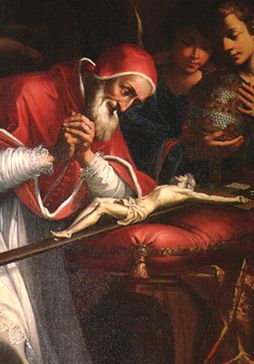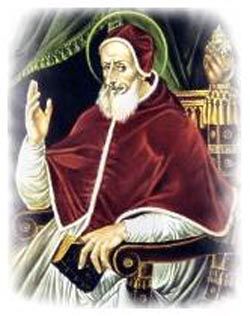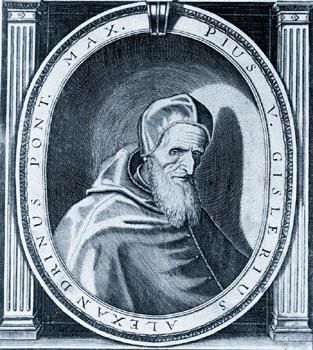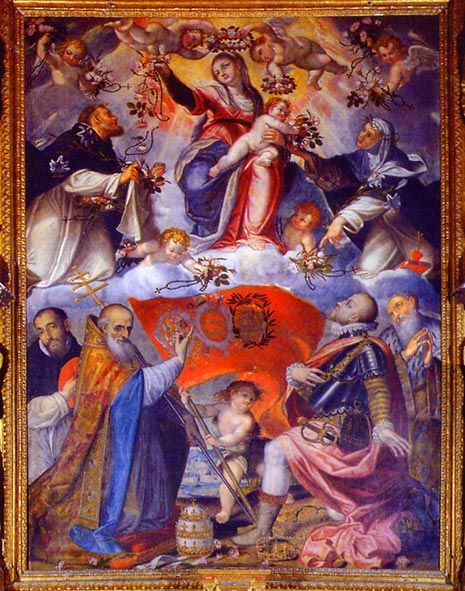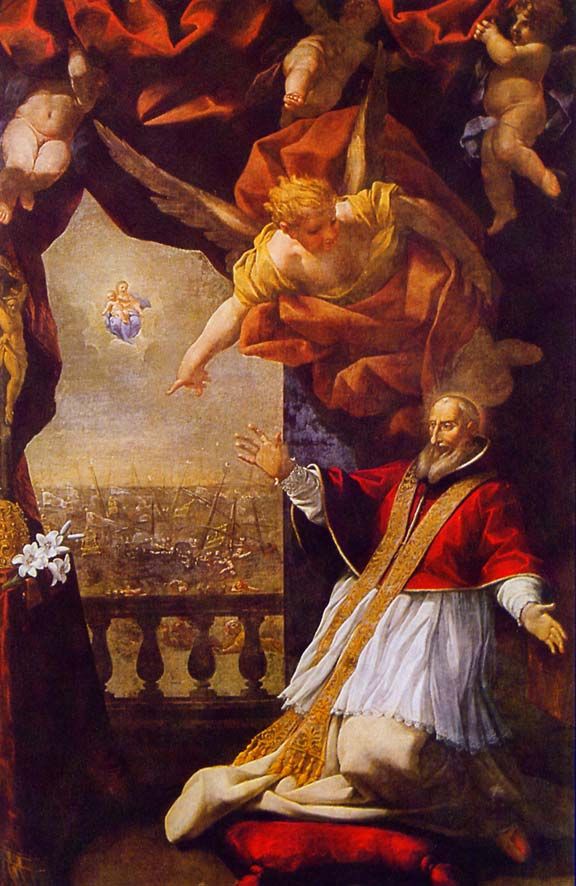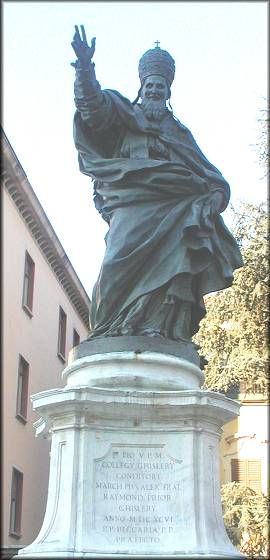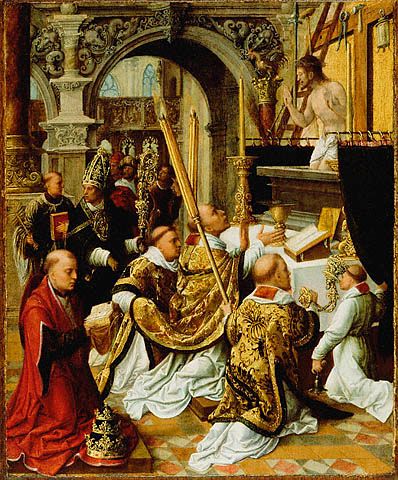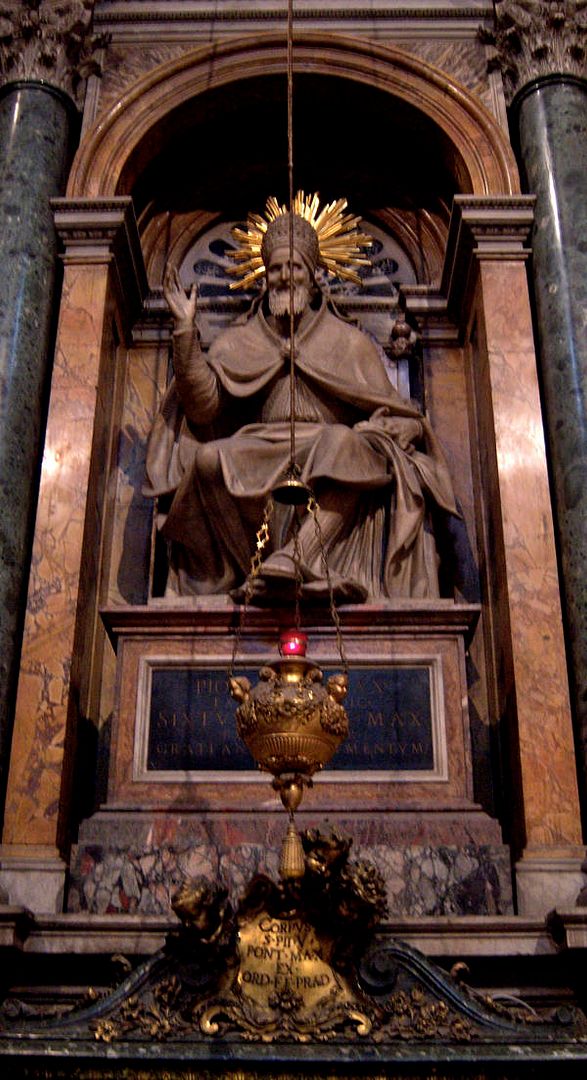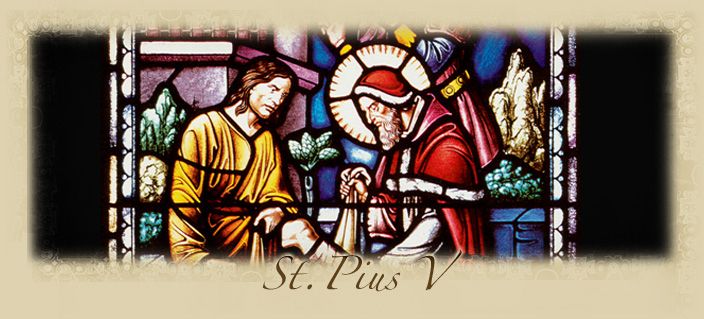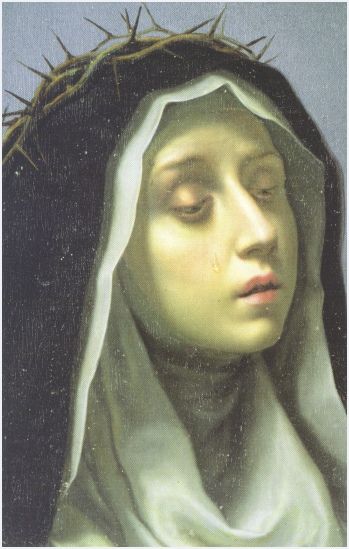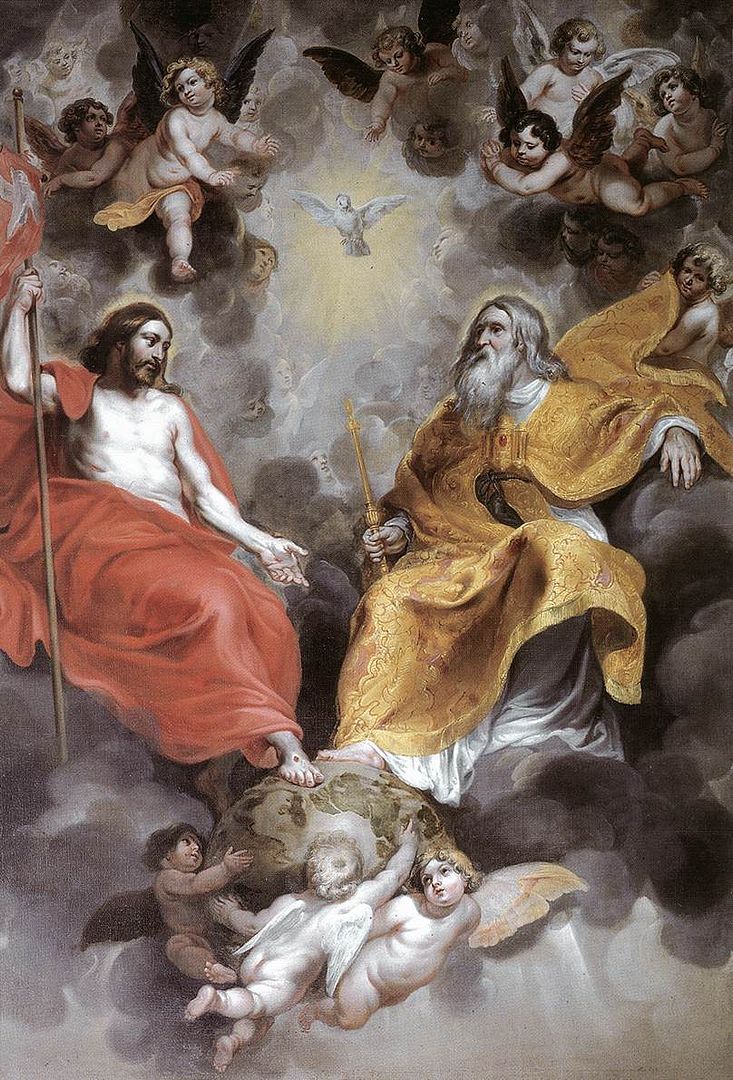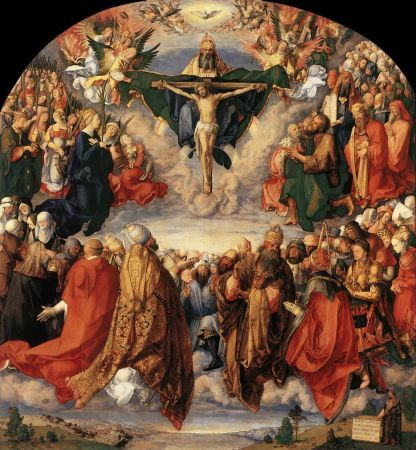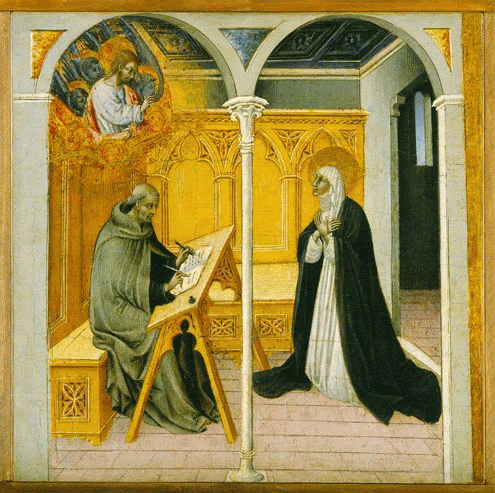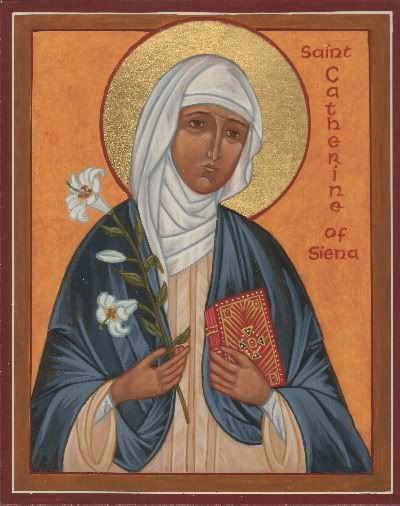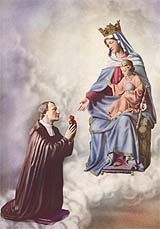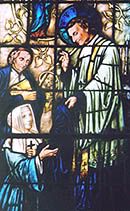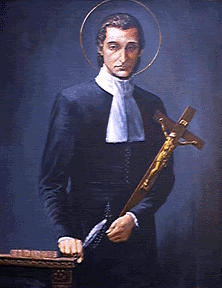Today, April 30, we celebrate the feast of Pope Saint Pius V (1504-1572), confessor, reformer, and “Pope of the Holy Rosary.” Throughout his life and papacy, Pope Pius V worked to reform and solidify Catholic unity, securing the traditional Latin Rite of Mass, establishing seminaries, and publishing works to be used in churches throughout the world. Along with this, Pope Pius V lived the simple life of a Dominican, refusing the riches and luxuries thrust upon him, and instead ministering to the poor and needy. Through his deep devotion and prayers to Our Blessed Mother, the Battle of Lepanto was decisively won for Christendom.
Pope Saint Pius V worked tirelessly to reform the Church. Below, his Apostolic Constitution, “Quo Primum,” declaring the sanctity and use of the Latin Rite. Written in 1570, and distributed to all dioceses, Pope Pius’ work was a solid foundation for the unification of the Church.
From the very first, upon Our elevation to the chief Apostleship, We gladly turned our mind and energies and directed all out thoughts to those matters which concerned the preservation of a pure liturgy, and We strove with God's help, by every means in our power, to accomplish this purpose. For, besides other decrees of the sacred Council of Trent, there were stipulations for Us to revise and re-edit the sacred books: the Catechism, the Missal and the Breviary. With the Catechism published for the instruction of the faithful, by God's help, and the Breviary thoroughly revised for the worthy praise of God, in order that the Missal and Breviary may be in perfect harmony, as fitting and proper - for its most becoming that there be in the Church only one appropriate manner of reciting the Psalms and only one rite for the celebration of Mass - We deemed it necessary to give our immediate attention to what still remained to be done, viz, the re-editing of the Missal as soon as possible.
Hence, We decided to entrust this work to learned men of our selection. They very carefully collated all their work with the ancient codices in Our Vatican Library and with reliable, preserved or emended codices from elsewhere. Besides this, these men consulted the works of ancient and approved authors concerning the same sacred rites; and thus they have restored the Missal itself to the original form and rite of the holy Fathers. When this work has been gone over numerous times and further emended, after serious study and reflection, We commanded that the finished product be printed and published as soon as possible, so that all might enjoy the fruits of this labor; and thus, priests would know which prayers to use and which rites and ceremonies they were required to observe from now on in the celebration of Masses.
Let all everywhere adopt and observe what has been handed down by the Holy Roman Church, the Mother and Teacher of the other churches, and let Masses not be sung or read according to any other formula than that of this Missal published by Us. This ordinance applies henceforth, now, and forever, throughout all the provinces of the Christian world, to all patriarchs, cathedral churches, collegiate and parish churches, be they secular or religious, both of men and of women - even of military orders - and of churches or chapels without a specific congregation in which conventual Masses are sung aloud in choir or read privately in accord with the rites and customs of the Roman Church. This Missal is to be used by all churches, even by those which in their authorization are made exempt, whether by Apostolic indult, custom, or privilege, or even if by oath or official confirmation of the Holy See, or have their rights and faculties guaranteed to them by any other manner whatsoever.
This new rite alone is to be used unless approval of the practice of saying Mass differently was given at the very time of the institution and confirmation of the church by Apostolic See at least 200 years ago, or unless there has prevailed a custom of a similar kind which has been continuously followed for a period of not less than 200 years, in which most cases We in no wise rescind their above-mentioned prerogative or custom. However, if this Missal, which we have seen fit to publish, be more agreeable to these latter, We grant them permission to celebrate Mass according to its rite, provided they have the consent of their bishop or prelate or of their whole Chapter, everything else to the contrary notwithstanding.
All other of the churches referred to above, however, are hereby denied the use of other missals, which are to be discontinued entirely and absolutely; whereas, by this present Constitution, which will be valid henceforth, now, and forever, We order and enjoin that nothing must be added to Our recently published Missal, nothing omitted from it, nor anything whatsoever be changed within it under the penalty of Our displeasure.
We specifically command each and every patriarch, administrator, and all other persons or whatever ecclesiastical dignity they may be, be they even cardinals of the Holy Roman Church, or possessed of any other rank or pre-eminence, and We order them in virtue of holy obedience to chant or to read the Mass according to the rite and manner and norm herewith laid down by Us and, hereafter, to discontinue and completely discard all other rubrics and rites of other missals, however ancient, which they have customarily followed; and they must not in celebrating Mass presume to introduce any ceremonies or recite any prayers other than those contained in this Missal.
Furthermore, by these presents [this law], in virtue of Our Apostolic authority, We grant and concede in perpetuity that, for the chanting or reading of the Mass in any church whatsoever, this Missal is hereafter to be followed absolutely, without any scruple of conscience or fear of incurring any penalty, judgment, or censure, and may freely and lawfully be used. Nor are superiors, administrators, canons, chaplains, and other secular priests, or religious, of whatever title designated, obliged to celebrate the Mass otherwise than as enjoined by Us. We likewise declare and ordain that no one whosoever is forced or coerced to alter this Missal, and that this present document cannot be revoked or modified, but remain always valid and retain its full force notwithstanding the previous constitutions and decrees of the Holy See, as well as any general or special constitutions or edicts of provincial or synodal councils, and notwithstanding the practice and custom of the aforesaid churches, established by long and immemorial prescription - except, however, if more than two hundred years' standing.
It is Our will, therefore, and by the same authority, We decree that, after We publish this constitution and the edition of the Missal, the priests of the Roman Curia are, after thirty days, obliged to chant or read the Mass according to it; all others south of the Alps, after three months; and those beyond the Alps either within six months or whenever the Missal is available for sale. Wherefore, in order that the Missal be preserved incorrupt throughout the whole world and kept free of flaws and errors, the penalty for nonobservance for printers, whether mediately or immediately subject to Our dominion, and that of the Holy Roman Church, will be the forfeiting of their books and a fine of one hundred gold ducats, payable ipso facto to the Apostolic Treasury. Further, as for those located in other parts of the world, the penalty is excommunication latae sententiae, and such other penalties as may in Our judgment be imposed; and We decree by this law that they must not dare or presume either to print or to publish or to sell, or in any way to accept books of this nature without Our approval and consent, or without the express consent of the Apostolic Commissaries of those places, who will be appointed by Us. Said printer must receive a standard Missal and agree faithfully with it and in no wise vary from the Roman Missal of the large type (secundum magnum impressionem).
Accordingly, since it would be difficult for this present pronouncement to be sent to all parts of the Christian world and simultaneously come to light everywhere, We direct that it be, as usual, posted and published at the doors of the Basilica of the Prince of the Apostles, also at the Apostolic Chancery, and on the street at Campo Flora; furthermore, We direct that printed copies of this same edict signed by a notary public and made official by an ecclesiastical dignitary possess the same indubitable validity everywhere and in every nation, as if Our manuscript were shown there. Therefore, no one whosoever is permitted to alter this notice of Our permission, statute, ordinance, command, precept, grant, indult, declaration, will, decree, and prohibition. Should know that he will incur the wrath of Almighty God and of the Blessed Apostles Peter and Paul.
Given at St. Peter's in the year of the Lord's Incarnation, 1570, on the 14th of July of the Fifth year of Our Pontificate.
Why pray the Rosary every day for a year?
Each time the Blessed Virgin has appeared-- whether it be to Saint Bernadette Soubirous at Lourdes; to Lucia, Jacinta, and Francisco at Fatima; or to Mariette Beco at Banneux-- she has asserted the importance, saving grace, and power of praying the Holy Rosary on a daily basis. Based upon her words, the Rosary is penance and conversion for sinners, a pathway to peace, an end to war, and a powerful act of faith in Jesus Christ. Pope Paul VI presented the Rosary as a powerful means to reach Christ "not merely with Mary but indeed, insofar as this is possible to us, in the same way as Mary, who is certainly the one who thought about Him more than anyone else has ever done."
To show us how this is done, perhaps no one has been more eloquent than the great Cardinal Newman, who wrote: "The great power of the Rosary consists in the fact that it translates the Creed into Prayer. Of course, the Creed is already in a certain sense a prayer and a great act of homage towards God, but the Rosary brings us to meditate again on the great truth of His life and death, and brings this truth close to our hearts. Even Christians, although they know God, usually fear rather than love Him. The strength of the Rosary lies in the particular manner in which it considers these mysteries, since all our thinking about Christ is intertwined with the thought of His Mother, in the relations between Mother and Son; the Holy Family is presented to us, the home in which God lived His infinite love."
As Mary said at Fatima, "Jesus wants to use you to make Me known and loved. He wishes to establish the devotion to My Immaculate Heart throughout the world. I promise salvation to whoever embraces it; these souls will be dear to God, like flowers put by Me to adorn his throne."

Today, April 30, we celebrate the feast of Pope Saint Pius V (1504-1572), confessor, reformer, and “Pope of the Holy Rosary.” Throughout his life and papacy, Pope Pius V worked to reform and solidify Catholic unity, securing the traditional Latin Rite of Mass, establishing seminaries, and publishing works to be used in churches throughout the world. Along with this, Pope Pius V lived the simple life of a Dominican, refusing the riches and luxuries thrust upon him, and instead ministering to the poor and needy. Through his deep devotion and prayers to Our Blessed Mother, the Battle of Lepanto was decisively won for Christendom.
Born Michael Ghislieri to a poor, but noble family in Bosco, Italy, the future pope was raised with an excellent education in piety and holiness. As a child he tended the family’s sheep in the fields, but entered the Dominican Order at age fourteen, where he excelled at his studies. Recognized as a gifted scholar and observed to have a deep relationship with the Lord, Michael was appointed a lecturer in philosophy and theology at Pavia, and very early became involved in the reform movement in the Church.
At the age of 24, Michael was ordained a priest and continued his teaching of philosophy an divinity in Genoa. For the next sixteen years, Michael traveled to various Dominican houses and encouraged a stricter following of the Order's Rule with both words and example. These reforming labors brought him to the attention of other members of the reform movement, and he was given important positions (first Inquisitor, and then placed as authority over the Inquisition) in Como, Bergamo, and Rome.
In 1556, Michael was consecrated bishop of Sutri and Nepi, somewhat against his will, and later appointed to the diocese of Mondevi which had been ravaged by war. In a very short time, under his spiritual direction, the diocese was flourishing and prosperous. Michael worked to lead his flock with words and example and served as a continual messenger encouraging personal piety and devotion to God. Before long, he was elevated to the College of cardinals. His views on reform were often asked by the Holy Father, and he was noted for his boldness in expressing his views.
In December of 1565, Pope Pius IV died. Having successfully engineered the Council of Trent, his replacement would be charged with carrying out the decrees of the council. Somewhat surprisingly, Michael—a simple Dominican friar—was selected to ascend to the Chair of Peter. It was the late pontiff's nephew, Saint Charles Borromeo, who was the driving force in the election of Michael as the new pope, for he recognized that a remarkable leader would be needed if the decrees of the council were to bear fruit.
Michael took the name Pius V, and immediately set about reforming the Church and enforcing the decrees of Trent. His holiness and austerity of life were notable, and he succeeded in bringing simplicity even into the papal household. He refused to wear the flowing garments of previous popes and insisted upon wearing his white Dominican habit even as head of the Church. To this day, the pope wears white, a custom begun by this Dominican pontiff.
He began his pontificate by giving large alms to the poor, ill, and needy. In his charity he visited the hospitals, and sat by the bedside of the sick, consoling them and preparing them to die. He washed the feet of the poor, and embraced the lepers. As pontiff he practiced the virtues he had displayed as a monk and a bishop. His piety was not diminished, and, in spite of the heavy labors and anxieties of his office, he made at least two meditations a day on bended knees in presence of the Blessed Sacrament. He insisted on austerity and banished luxury from his court, raised the standard of morality.
Pope Pius V further labored with his friend, Saint Charles Borromeo, to lay a solid foundation and spread the Faith, preserving the doctrine of the Church. Through papal decrees and example, Pope Pius reformed the clergy, obliged his bishops to reside in their dioceses, and the cardinals to lead lives of simplicity and piety. He reformed the Cistercians, and supported the missions of the New World. Under his direction, seminaries were established, diocesan synods were held, and the Breviary and Missal were reformed. Pope Pius V published catechisms, ordered a revision of the Latin Vulgate, and revitalized the study of theology and canon law. Pope Pius also established the Confraternity of Christian Doctrine (CCD) classes for the young.
In striving to reform both Church and state, Pius encountered vehement opposition from England's Queen Elizabeth (who he excommunicated) and the Roman Emperor Maximilian II. Problems in France and in the Netherlands also hindered the pope’s hopes for a Europe united against the Turks. Only at the last minute, through considerable effort, was he able to organize a fleet which won a decisive victory in the Gulf of Lepanto, off Greece, on October 7, 1571. The defeat of the Turks at Lepanto, is recognized as the result of his prayers and efforts to Our Blessed Mother, Our Lady of the Rosary. Before the victorious fleet returned to Rome, the pope had had knowledge of the victory through a miraculous vision of Mary. He proclaimed a period of thanksgiving and placed the invocation "Mary, Help of Christians" in the Litany of Loreto, establishing the feast in commemoration of the victory.
His faith and devotion to Mary was made evident through his example, as well as his papal writings. In his “Consuieverunt Romani,” published in 1569, Pope Pius V wrote about the power and devotion of the Holy Rosary:
The Roman Pontiffs, and the other Holy Fathers, our predecessors, when they were pressed in upon by temporal or spiritual wars, or troubled by other trials, in order that they might more easily escape from these, and having achieved tranquility, might quietly and fervently be free to devote themselves to God, were wont to implore the divine assistance, through supplications or Litanies to call forth the support of the saints, and with David to lift up their eyes unto the Mountains, trusting with firm hope that thence would they receive aid.
1. Prompted by their example, and, as is piously believed, by the Holy Ghost, the inspired Blessed founder of the Order of Friars Preachers, (whose institutes and rule we ourselves expressly professed when we were in minor orders), in circumstances similar to those in which we now find ourselves, when parts of France and of Italy were unhappily troubled by the heresy of the Albegenses, which blinded so many of the worldly that they were raging most savagely against the priests of the Lord and the clergy, raised his eyes up unto heaven, unto that mountain of the Glorious Virgin Mary, loving Mother of God. For she by her seed has crushed the head of the twisted serpent, and has alone destroyed all heresies, and by the blessed fruit of her womb has saved a world condemned by the fall of our first parent. From her, without human hand, was that stone cut, which, struck by wood, poured forth the abundantly flowing waters of graces. And so Dominic looked to that simple way of praying and beseeching God, accessible to all and wholly pious, which is called the Rosary, or Psalter of the Blessed Virgin Mary, in which the same most Blessed Virgin is venerated by the angelic greeting repeated one hundred and fifty times, that is, according to the number of the Davidic Psalter, and by the Lord's Prayer with each decade. Interposed with these prayers are certain meditations showing forth the entire life of Our Lord Jesus Christ, thus completing the method of prayer devised by the by the Fathers of the Holy Roman Church. This same method St. Dominic propagated, and it was, spread by the Friars of Blessed Dominic, namely, of the aforementioned Order, and accepted by not a few of the people. Christ's faithful, inflamed by these prayers, began immediately to be changed into new men. The darkness of heresy began to be dispelled, and the light of the Catholic Faith to be revealed. Sodalities for this form of prayer began to be instituted in many places by the Friars of the same Order, legitimately deputed to this work by their Superiors, and confreres began to be enrolled together.
2. Following the example of our predecessors, seeing that the Church militant, which God has placed in our hands, in these our times is tossed this way and that by so many heresies, and is grievously troubled and afflicted by so many wars, and by the deprave morals of men, we also raise our eyes, weeping but full of hope, unto that same mountain, whence every aid comes forth, and we encourage and admonish each member of Christ's faithful to do likewise in the Lord.
Pope Pius V died in 1572, at the age of sixty-eight, still tirelessly serving the Church. His relics were placed in the Basilica of Mary Major, as a tribute to his eternal devotion to the Blessed Virgin, where they are venerated today.
Father,
You chose Saint Pius V as pope of Your Church
to protect the faith and give You more fitting worship.
By his prayers,
help us to celebrate Your holy mysteries
with a living faith and an effective love.
We ask this through our Lord Jesus Christ, Your Son,
who lives and reigns with You and the Holy Spirit,
one God, for ever and ever. Amen
Year 2: Day 121 of 365
Prayer Intentions: Continued Church Reform; Tireless service and unending devotion.
Requested Intentions: For children’s faith journey; Recovery of a friend suffering from addiction (M); Successful employment (P); Obedience to the will of the Lord (J); Financial recovery (S); Freedom from evil influence (I); Recovery from illness (J); Freedom from addiction (J); Successful transplant surgery (K); Healing for a daughter (T); Acceptance into school (V); Successful immigration; for a sister’s career and marriage (F); Financial recovery; Successful ministry (A); Financial ability to send children to school (S); Safe return of a runaway (J); Healing of a family (J); Reconciliation of marriage (S); Healing of a daughter with congenital heart disease (F); Healing and an end to suffering (J); For the children (M); For a son fighting a rare immune system disease (R); Freedom from imprisonment (J); Employment and end to depression (H); Successful employment (A); Health for a soon to be delivered baby (T); Financial security (L); Healing of tooth pain (A); Health of expectant mother and child (R); Purification of the souls in Purgatory (A); Guidance in studies (J); Healing and security for a displaced family (C); Healing of high blood pressure; Recovery of brother following surgery (A); For a sister in trouble, that she may make better decisions in the light of Christ (M); Health of expectant mother and child (R); Attainment of funds for surgery (J).
Born Michael Ghislieri to a poor, but noble family in Bosco, Italy, the future pope was raised with an excellent education in piety and holiness. As a child he tended the family’s sheep in the fields, but entered the Dominican Order at age fourteen, where he excelled at his studies. Recognized as a gifted scholar and observed to have a deep relationship with the Lord, Michael was appointed a lecturer in philosophy and theology at Pavia, and very early became involved in the reform movement in the Church.
At the age of 24, Michael was ordained a priest and continued his teaching of philosophy an divinity in Genoa. For the next sixteen years, Michael traveled to various Dominican houses and encouraged a stricter following of the Order's Rule with both words and example. These reforming labors brought him to the attention of other members of the reform movement, and he was given important positions (first Inquisitor, and then placed as authority over the Inquisition) in Como, Bergamo, and Rome.
In 1556, Michael was consecrated bishop of Sutri and Nepi, somewhat against his will, and later appointed to the diocese of Mondevi which had been ravaged by war. In a very short time, under his spiritual direction, the diocese was flourishing and prosperous. Michael worked to lead his flock with words and example and served as a continual messenger encouraging personal piety and devotion to God. Before long, he was elevated to the College of cardinals. His views on reform were often asked by the Holy Father, and he was noted for his boldness in expressing his views.
In December of 1565, Pope Pius IV died. Having successfully engineered the Council of Trent, his replacement would be charged with carrying out the decrees of the council. Somewhat surprisingly, Michael—a simple Dominican friar—was selected to ascend to the Chair of Peter. It was the late pontiff's nephew, Saint Charles Borromeo, who was the driving force in the election of Michael as the new pope, for he recognized that a remarkable leader would be needed if the decrees of the council were to bear fruit.
Michael took the name Pius V, and immediately set about reforming the Church and enforcing the decrees of Trent. His holiness and austerity of life were notable, and he succeeded in bringing simplicity even into the papal household. He refused to wear the flowing garments of previous popes and insisted upon wearing his white Dominican habit even as head of the Church. To this day, the pope wears white, a custom begun by this Dominican pontiff.
He began his pontificate by giving large alms to the poor, ill, and needy. In his charity he visited the hospitals, and sat by the bedside of the sick, consoling them and preparing them to die. He washed the feet of the poor, and embraced the lepers. As pontiff he practiced the virtues he had displayed as a monk and a bishop. His piety was not diminished, and, in spite of the heavy labors and anxieties of his office, he made at least two meditations a day on bended knees in presence of the Blessed Sacrament. He insisted on austerity and banished luxury from his court, raised the standard of morality.
Pope Pius V further labored with his friend, Saint Charles Borromeo, to lay a solid foundation and spread the Faith, preserving the doctrine of the Church. Through papal decrees and example, Pope Pius reformed the clergy, obliged his bishops to reside in their dioceses, and the cardinals to lead lives of simplicity and piety. He reformed the Cistercians, and supported the missions of the New World. Under his direction, seminaries were established, diocesan synods were held, and the Breviary and Missal were reformed. Pope Pius V published catechisms, ordered a revision of the Latin Vulgate, and revitalized the study of theology and canon law. Pope Pius also established the Confraternity of Christian Doctrine (CCD) classes for the young.
In striving to reform both Church and state, Pius encountered vehement opposition from England's Queen Elizabeth (who he excommunicated) and the Roman Emperor Maximilian II. Problems in France and in the Netherlands also hindered the pope’s hopes for a Europe united against the Turks. Only at the last minute, through considerable effort, was he able to organize a fleet which won a decisive victory in the Gulf of Lepanto, off Greece, on October 7, 1571. The defeat of the Turks at Lepanto, is recognized as the result of his prayers and efforts to Our Blessed Mother, Our Lady of the Rosary. Before the victorious fleet returned to Rome, the pope had had knowledge of the victory through a miraculous vision of Mary. He proclaimed a period of thanksgiving and placed the invocation "Mary, Help of Christians" in the Litany of Loreto, establishing the feast in commemoration of the victory.
His faith and devotion to Mary was made evident through his example, as well as his papal writings. In his “Consuieverunt Romani,” published in 1569, Pope Pius V wrote about the power and devotion of the Holy Rosary:
The Roman Pontiffs, and the other Holy Fathers, our predecessors, when they were pressed in upon by temporal or spiritual wars, or troubled by other trials, in order that they might more easily escape from these, and having achieved tranquility, might quietly and fervently be free to devote themselves to God, were wont to implore the divine assistance, through supplications or Litanies to call forth the support of the saints, and with David to lift up their eyes unto the Mountains, trusting with firm hope that thence would they receive aid.
1. Prompted by their example, and, as is piously believed, by the Holy Ghost, the inspired Blessed founder of the Order of Friars Preachers, (whose institutes and rule we ourselves expressly professed when we were in minor orders), in circumstances similar to those in which we now find ourselves, when parts of France and of Italy were unhappily troubled by the heresy of the Albegenses, which blinded so many of the worldly that they were raging most savagely against the priests of the Lord and the clergy, raised his eyes up unto heaven, unto that mountain of the Glorious Virgin Mary, loving Mother of God. For she by her seed has crushed the head of the twisted serpent, and has alone destroyed all heresies, and by the blessed fruit of her womb has saved a world condemned by the fall of our first parent. From her, without human hand, was that stone cut, which, struck by wood, poured forth the abundantly flowing waters of graces. And so Dominic looked to that simple way of praying and beseeching God, accessible to all and wholly pious, which is called the Rosary, or Psalter of the Blessed Virgin Mary, in which the same most Blessed Virgin is venerated by the angelic greeting repeated one hundred and fifty times, that is, according to the number of the Davidic Psalter, and by the Lord's Prayer with each decade. Interposed with these prayers are certain meditations showing forth the entire life of Our Lord Jesus Christ, thus completing the method of prayer devised by the by the Fathers of the Holy Roman Church. This same method St. Dominic propagated, and it was, spread by the Friars of Blessed Dominic, namely, of the aforementioned Order, and accepted by not a few of the people. Christ's faithful, inflamed by these prayers, began immediately to be changed into new men. The darkness of heresy began to be dispelled, and the light of the Catholic Faith to be revealed. Sodalities for this form of prayer began to be instituted in many places by the Friars of the same Order, legitimately deputed to this work by their Superiors, and confreres began to be enrolled together.
2. Following the example of our predecessors, seeing that the Church militant, which God has placed in our hands, in these our times is tossed this way and that by so many heresies, and is grievously troubled and afflicted by so many wars, and by the deprave morals of men, we also raise our eyes, weeping but full of hope, unto that same mountain, whence every aid comes forth, and we encourage and admonish each member of Christ's faithful to do likewise in the Lord.
Pope Pius V died in 1572, at the age of sixty-eight, still tirelessly serving the Church. His relics were placed in the Basilica of Mary Major, as a tribute to his eternal devotion to the Blessed Virgin, where they are venerated today.
Father,
You chose Saint Pius V as pope of Your Church
to protect the faith and give You more fitting worship.
By his prayers,
help us to celebrate Your holy mysteries
with a living faith and an effective love.
We ask this through our Lord Jesus Christ, Your Son,
who lives and reigns with You and the Holy Spirit,
one God, for ever and ever. Amen
Year 2: Day 121 of 365
Prayer Intentions: Continued Church Reform; Tireless service and unending devotion.
Requested Intentions: For children’s faith journey; Recovery of a friend suffering from addiction (M); Successful employment (P); Obedience to the will of the Lord (J); Financial recovery (S); Freedom from evil influence (I); Recovery from illness (J); Freedom from addiction (J); Successful transplant surgery (K); Healing for a daughter (T); Acceptance into school (V); Successful immigration; for a sister’s career and marriage (F); Financial recovery; Successful ministry (A); Financial ability to send children to school (S); Safe return of a runaway (J); Healing of a family (J); Reconciliation of marriage (S); Healing of a daughter with congenital heart disease (F); Healing and an end to suffering (J); For the children (M); For a son fighting a rare immune system disease (R); Freedom from imprisonment (J); Employment and end to depression (H); Successful employment (A); Health for a soon to be delivered baby (T); Financial security (L); Healing of tooth pain (A); Health of expectant mother and child (R); Purification of the souls in Purgatory (A); Guidance in studies (J); Healing and security for a displaced family (C); Healing of high blood pressure; Recovery of brother following surgery (A); For a sister in trouble, that she may make better decisions in the light of Christ (M); Health of expectant mother and child (R); Attainment of funds for surgery (J).
Today, April 29, we celebrate the feast day of a truly holy woman, Saint Catherine of Siena (1347-1380), virgin, mystic, and Doctor of the Church. A individual must fulfill three requirements to be deemed a Doctor of the Church: 1) holiness that is truly outstanding, even among saints; 2) depth of doctrinal insight; and 3) an extensive body of writings which the church can recommend as an expression of the authentic and life-giving Catholic Tradition. The life of Saint Catherine of Siena easily meets these criteria.
Saint Catherine wrote many works, including prayers, treatises, and dialogues with the Lord. Below, and excerpt on the Trinity, from “On Divine Providence.”
Eternal God, eternal Trinity, you have made the blood of Christ so precious through his sharing in your divine nature. You are a mystery as deep as the sea; the more I search, the more I find, and the more I find the more I search for you. But I can never be satisfied; what I receive will ever leave me desiring more. When you fill my soul I have an even greater hunger, and I grow more famished for your light. I desire above all to see you, the true light, as you really are.
I have tasted and seen the depth of your mystery and the beauty of your creation with the light of my understanding. I have clothed myself with your likeness and have seen what I shall be. Eternal Father, you have given me a share in your power and the wisdom that Christ claims as his own, and your Holy Spirit has given me the desire to love you. You are my Creator, eternal Trinity, and I am your creature. You have made of me a new creation in the blood of your Son, and I know that you are moved with love at the beauty of your creation, for you have enlightened me.
Eternal Trinity, Godhead, mystery deep as the sea, you could give me no greater gift than the gift of yourself. For you are a fire ever burning and never consumed, which itself consumes all the selfish love that fills my being. Yes, you are a fire that takes away the coldness, illuminates the mind with its light and causes me to know your truth. By this light, reflected as it were in a mirror, I recognise that you are the highest good, one we can neither comprehend nor fathom. And I know that you are beauty and wisdom itself. The food of angels, you gave yourself to man in the fire of your love.
You are the garment which covers our nakedness, and in our hunger you are a satisfying food, for you are sweetness and in you there is no taste of bitterness, O triune God!
Saint Catherine wrote many works, including prayers, treatises, and dialogues with the Lord. Below, and excerpt on the Trinity, from “On Divine Providence.”
Eternal God, eternal Trinity, you have made the blood of Christ so precious through his sharing in your divine nature. You are a mystery as deep as the sea; the more I search, the more I find, and the more I find the more I search for you. But I can never be satisfied; what I receive will ever leave me desiring more. When you fill my soul I have an even greater hunger, and I grow more famished for your light. I desire above all to see you, the true light, as you really are.
I have tasted and seen the depth of your mystery and the beauty of your creation with the light of my understanding. I have clothed myself with your likeness and have seen what I shall be. Eternal Father, you have given me a share in your power and the wisdom that Christ claims as his own, and your Holy Spirit has given me the desire to love you. You are my Creator, eternal Trinity, and I am your creature. You have made of me a new creation in the blood of your Son, and I know that you are moved with love at the beauty of your creation, for you have enlightened me.
Eternal Trinity, Godhead, mystery deep as the sea, you could give me no greater gift than the gift of yourself. For you are a fire ever burning and never consumed, which itself consumes all the selfish love that fills my being. Yes, you are a fire that takes away the coldness, illuminates the mind with its light and causes me to know your truth. By this light, reflected as it were in a mirror, I recognise that you are the highest good, one we can neither comprehend nor fathom. And I know that you are beauty and wisdom itself. The food of angels, you gave yourself to man in the fire of your love.
You are the garment which covers our nakedness, and in our hunger you are a satisfying food, for you are sweetness and in you there is no taste of bitterness, O triune God!
Today, April 29, we celebrate the feast day of a truly holy woman, Saint Catherine of Siena (1347-1380), virgin, mystic, and Doctor of the Church. A individual must fulfill three requirements to be deemed a Doctor of the Church: 1) holiness that is truly outstanding, even among saints; 2) depth of doctrinal insight; and 3) an extensive body of writings which the church can recommend as an expression of the authentic and life-giving Catholic Tradition. The life of Saint Catherine of Siena easily meets these criteria.
Saint Catherine was born the 23rd child of a poor wool dyer in Northern Italy. She was marked by the sign of holiness from a young age, clearly experiencing visions by the age of six in which she saw both her neighbors and their guardian angels simultaneously. That same year, at age 6, she was observed to fall into a religious ecstasy while reporting a vision of Christ, dressed as the pope, and the apostles. In her vision, Christ blessed her, anointing her with her earthly mission. As she aged, her intelligence and beauty grew, along with her piety. As she approached marrying age, her mother encouraged her to look for a spouse, but Catherine instead cut off her hair (to make herself less attractive) and committed herself to a life of prayer and meditation, consecrated a virgin bride of Christ. While her mother was distraught, her father encouraged her, setting aside a room of the family’s small home for Catherine to use in pursuit of her spiritual endeavors.
At age sixteen, Catherine took the habit of the Dominican Tertiaries (Third Order of Saint Dominic), where she continued to have ecstatic visions of Christ, Our Blessed Mother, and the saints. During these visions, she engaged in familiar conversations with Christ over three years, and underwent the mystical experience of “mystical espousal” to Christ.
Despite her lack of formal education, the writings of Saint Catherine are regarded as treasures of the Church, and her mind one of the most brilliant theological minds throughout the ages. She was a prolific writer, the most famous of her works being The Dialogue, which she dictated while experiencing her ecstatic visions and conversations with Christ. In this work, she expounds on the mysteries of the Church, the Creed, the sinfulness of man, and the divine mercy of the Lord.
Saint Catherine experienced visions of both heaven and hell while on earth. She worked tirelessly, through letters (over 400!) and counsel to church and world leaders—including Pope Gregory XI and various kings and queens of the time. Her goal was church reform, inspired by her visions of Christ, and her call to public service. Saint Catherine devoted her free time to the poor and ill, and the conversion of sinners. Five years prior to her death, Catherine was graced with the stigmata, although she kept this a secret due to her humility. Saint Catherine is said to have eaten very little during her life, with the exception of Holy Eucharist each day. She bore continuous stomach ailment and discomfort without complaint, uniting her suffering to that of Christ. Saint Catherine engaged in severe forms of mortification, wearing a metal shirt which cut into her hips, beating herself with a chain for her own sins (and those of others), sleeping on a wooden bench, and oftentimes refusing to speak. For Catherine, the greater her suffering, the greater the triumph of heaven!
During her lifetime, the Church experienced great turmoil, which Catherine sought to reconcile. She offered herself and her life as a victim for the Church in it’s agony. Saint Catherine died when she was only 33, and upon exhumation of her body over 100 years later, was found to be incorrupt. Her head and thumb, miraculously smuggled out of Rome during time of persecution (upon examination by guards, the bag in which her head was hidden was observed to be filled with rose petals, but upon moving past the guards, the roses disappeared and the holy face of Saint Catherine returned), were returned to Siena, where they remain incorrupt in the Basilica of San Domenico. Numerous miracles have been recorded through her intercession.
The life and inspiration of Saint Catherine of Siena can best be found in her words, preserved in over 400 letters written in her hand, numerous prayers, as well as in The Dialogue. Selected quotations are presented below. The words of Saint Catherine remind us of our faith, of our weakness and sinfulness, and of the unending love and mercy of the Lord. In her words, everything we do should begin in love—love for our neighbors, love for our Lord, love for ourselves. The Lord does nothing without love in mind, and Saint Catherine reminds us that neither should we!
Selected Writings of Saint Catherine of Siena
“So take a lesson from the true father and shepherd. For you see that now is the time to give your life for the little sheep who have left the flock. You must seek and win them back by using patience and war–by war I mean by raising the standard of the sweet blazing cross and setting out against the unbelievers. so you must sleep no longer, but wake up and raise that standard courageously. I am confident that by God’s measureless goodness you will win back the unbelievers and [at the same time] correct the wrongdoing of Christians, because everyone will come running to the fragrance of the cross, even those who have rebelled against you most.”
“No one should judge that he has greater perfection because he performs great penances and gives himself in excess to the staying of the body than he who does less, inasmuch as neither virtue nor merit consists therein; for otherwise he would be an evil case, who for some legitimate reason was unable to do actual penance. Merit consists in the virtue of love alone, flavored with the light of true discretion without which the soul is worth nothing."
"If not for my sins, the world would be a better place."
“You know that the devil is not cast out by the devil, but by virtue.”
"There is no perfect virtue-none that bears fruit- unless it is exercised by means of our neighbor."
“Charity is the sweet and holy bond which links the soul with its Creator: it binds God with man and man with God.”
“Eternal Trinity, Godhead, mystery deep as the sea, you could give me no greater gift than the gift of yourself. For you are a fire ever burning and never consumed, which itself consumes all the selfish love that fills my being. Yes, you are a fire that takes away the coldness, illuminates the mind with its light, and causes me to know your truth. And I know that you are beauty and wisdom itself. The food of angels, you gave yourself to man in the fire of your love.”
“Everything comes from love, all is ordained for the salvation of man, God does nothing without this goal in mind.”
“And let the truth be your delight; let it always be in your mouth, and proclaim it when it is needed. Proclaim it lovingly and to everyone, especially those whom you love with a special love---but with a certain congeniality, putting the shortcomings of the other person on your own shoulders. If in the past you haven't done it as sensitively as you should, let's do better in the future.”
“I long to see you a productive tree planted in fertile soil and laden with sweet mellow fruit. For a tree uprooted from the soil (I mean the soil of true self-knowledge) would dry up and bear no fruit.”
“We lack nothing but virtue and hunger for the salvation of souls---but there is a remedy for this, father: that we do away with loving ourselves or anyone or anything else apart from God. Let us concentrate no longer on friends or relatives or on our own material needs, but only on virtue and the promotion of spiritual matters. For the only reason you are wanting for material things is your abandonment of concern for the spiritual.”
“Learn from the Master of truth, who preached virtue only after he had practiced it.... To this wonderful school, then, my children!... Open your ears, I tell you, to hear his teaching --- and it is this: voluntary poverty; patience in the face of injury; returning good to those who do us evil; being little, humble, oppressed and forsaken in the world; with ridicule, torment, wrongs, insults, detraction, gossip, difficulties, and harassment from the world.... No more indifference, then! No more sleeping in unawareness! No, with bold and blazing heart stretch your sweet loving desires to go and give honor to God and your best efforts to your neighbors, never losing sight of your objective, Christ crucified.”
"Love is the most necessary of all virtues. Love in the person who preaches the word of God is like fire in a musket. If a person were to throw a bullet with his hands, he would hardly make a dent in anything; but if the person takes the same bullet and ignites some gunpowder behind it, it can kill. It is much the same with the word of God. If it is spoken by someone who is filled with the fire of charity- the fire of love of God and neighbor- it will work wonders."
"Everything comes from love, all is ordained for the salvation of man, God does nothing without this goal in mind."
"Merit consists in the virtue of love alone, flavored with the light of true discretion without which the soul is worth nothing."
"Strange that so much suffering is caused because of the misunderstandings of God's true nature. God's heart is more gentle than the Virgin's first kiss upon the Christ. And God's forgiveness to all, to any thought or act, is more certain than our own being."
“When then, eternal Father, did you create this creature of yours?…You show me that you made us for one reason only: in your light you saw yourself compelled by the fire of your love to give us being in spite of the evil we would commit against you, eternal Father. It was fire, then, that compelled you. Oh, unutterable love, even though you saw all the evils your creatures would commit against your infinite goodness, you acted as if you did not see and set your eye on the beauty of your creature, with whom you had fallen in love like one drunk and crazy with love…You are the fire, nothing but a fire of love, crazy over what you have made.”
“My Lord, turn the eye of your mercy on your people and on your mystic body, holy Church. How much greater would be your glory if you would pardon so many and give them the light of knowledge! For then they would surely all praise you, when they see that your infinite goodness has saved them from deadly sin and eternal damnation. How much greater this than to have praise only from my wretched self....
So I beg you, divine eternal love, to take your revenge on me, and be merciful to your people. I will not leave your presence till I see that you have been merciful to them.”
Prayers Composed by Saint Catherine of Siena
Holy Spirit, come into my heart, by your power I journey to You, God, and grant me charity with fear. Protect me, o Christ, from every evil thought, warm me with Your sweet love, so that each burden seems light to me. My holy Father and my sweet Lord, help me always in all my endeavors, Christ love, Christ love. Amen.
Precious Blood,
Ocean of Divine Mercy:
Flow upon us!
Precious Blood,
Most pure Offering:
Procure us every Grace!
Precious Blood,
Hope and Refuge of sinners:
Atone for us!
Precious Blood,
Delight of holy souls:
Draw us! Amen.
Prayer Intentions: Lives led by love.
Requested Intentions: For children’s faith journey; Recovery of a friend suffering from addiction (M); Successful employment (P); Obedience to the will of the Lord (J); Financial recovery (S); Freedom from evil influence (I); Recovery from illness (J); Freedom from addiction (J); Successful transplant surgery (K); Healing for a daughter (T); Acceptance into school (V); Successful immigration; for a sister’s career and marriage (F); Financial recovery; Successful ministry (A); Financial ability to send children to school (S); Safe return of a runaway (J); Healing of a family (J); Reconciliation of marriage (S); Healing of a daughter with congenital heart disease (F); Healing and an end to suffering (J); For the children (M); For a son fighting a rare immune system disease (R); Freedom from imprisonment (J); Employment and end to depression (H); Successful employment (A); Health for a soon to be delivered baby (T); Financial security (L); Healing of tooth pain (A); Health of expectant mother and child (R); Purification of the souls in Purgatory (A); Guidance in studies (J); Healing and security for a displaced family (C); Healing of high blood pressure; Recovery of brother following surgery (A); For a sister in trouble, that she may make better decisions in the light of Christ (M); Health of expectant mother and child (R); Attainment of funds for surgery (J).
Saint Catherine was born the 23rd child of a poor wool dyer in Northern Italy. She was marked by the sign of holiness from a young age, clearly experiencing visions by the age of six in which she saw both her neighbors and their guardian angels simultaneously. That same year, at age 6, she was observed to fall into a religious ecstasy while reporting a vision of Christ, dressed as the pope, and the apostles. In her vision, Christ blessed her, anointing her with her earthly mission. As she aged, her intelligence and beauty grew, along with her piety. As she approached marrying age, her mother encouraged her to look for a spouse, but Catherine instead cut off her hair (to make herself less attractive) and committed herself to a life of prayer and meditation, consecrated a virgin bride of Christ. While her mother was distraught, her father encouraged her, setting aside a room of the family’s small home for Catherine to use in pursuit of her spiritual endeavors.
At age sixteen, Catherine took the habit of the Dominican Tertiaries (Third Order of Saint Dominic), where she continued to have ecstatic visions of Christ, Our Blessed Mother, and the saints. During these visions, she engaged in familiar conversations with Christ over three years, and underwent the mystical experience of “mystical espousal” to Christ.
Despite her lack of formal education, the writings of Saint Catherine are regarded as treasures of the Church, and her mind one of the most brilliant theological minds throughout the ages. She was a prolific writer, the most famous of her works being The Dialogue, which she dictated while experiencing her ecstatic visions and conversations with Christ. In this work, she expounds on the mysteries of the Church, the Creed, the sinfulness of man, and the divine mercy of the Lord.
Saint Catherine experienced visions of both heaven and hell while on earth. She worked tirelessly, through letters (over 400!) and counsel to church and world leaders—including Pope Gregory XI and various kings and queens of the time. Her goal was church reform, inspired by her visions of Christ, and her call to public service. Saint Catherine devoted her free time to the poor and ill, and the conversion of sinners. Five years prior to her death, Catherine was graced with the stigmata, although she kept this a secret due to her humility. Saint Catherine is said to have eaten very little during her life, with the exception of Holy Eucharist each day. She bore continuous stomach ailment and discomfort without complaint, uniting her suffering to that of Christ. Saint Catherine engaged in severe forms of mortification, wearing a metal shirt which cut into her hips, beating herself with a chain for her own sins (and those of others), sleeping on a wooden bench, and oftentimes refusing to speak. For Catherine, the greater her suffering, the greater the triumph of heaven!
During her lifetime, the Church experienced great turmoil, which Catherine sought to reconcile. She offered herself and her life as a victim for the Church in it’s agony. Saint Catherine died when she was only 33, and upon exhumation of her body over 100 years later, was found to be incorrupt. Her head and thumb, miraculously smuggled out of Rome during time of persecution (upon examination by guards, the bag in which her head was hidden was observed to be filled with rose petals, but upon moving past the guards, the roses disappeared and the holy face of Saint Catherine returned), were returned to Siena, where they remain incorrupt in the Basilica of San Domenico. Numerous miracles have been recorded through her intercession.
The life and inspiration of Saint Catherine of Siena can best be found in her words, preserved in over 400 letters written in her hand, numerous prayers, as well as in The Dialogue. Selected quotations are presented below. The words of Saint Catherine remind us of our faith, of our weakness and sinfulness, and of the unending love and mercy of the Lord. In her words, everything we do should begin in love—love for our neighbors, love for our Lord, love for ourselves. The Lord does nothing without love in mind, and Saint Catherine reminds us that neither should we!
Selected Writings of Saint Catherine of Siena
“So take a lesson from the true father and shepherd. For you see that now is the time to give your life for the little sheep who have left the flock. You must seek and win them back by using patience and war–by war I mean by raising the standard of the sweet blazing cross and setting out against the unbelievers. so you must sleep no longer, but wake up and raise that standard courageously. I am confident that by God’s measureless goodness you will win back the unbelievers and [at the same time] correct the wrongdoing of Christians, because everyone will come running to the fragrance of the cross, even those who have rebelled against you most.”
“No one should judge that he has greater perfection because he performs great penances and gives himself in excess to the staying of the body than he who does less, inasmuch as neither virtue nor merit consists therein; for otherwise he would be an evil case, who for some legitimate reason was unable to do actual penance. Merit consists in the virtue of love alone, flavored with the light of true discretion without which the soul is worth nothing."
"If not for my sins, the world would be a better place."
“You know that the devil is not cast out by the devil, but by virtue.”
"There is no perfect virtue-none that bears fruit- unless it is exercised by means of our neighbor."
“Charity is the sweet and holy bond which links the soul with its Creator: it binds God with man and man with God.”
“Eternal Trinity, Godhead, mystery deep as the sea, you could give me no greater gift than the gift of yourself. For you are a fire ever burning and never consumed, which itself consumes all the selfish love that fills my being. Yes, you are a fire that takes away the coldness, illuminates the mind with its light, and causes me to know your truth. And I know that you are beauty and wisdom itself. The food of angels, you gave yourself to man in the fire of your love.”
“Everything comes from love, all is ordained for the salvation of man, God does nothing without this goal in mind.”
“And let the truth be your delight; let it always be in your mouth, and proclaim it when it is needed. Proclaim it lovingly and to everyone, especially those whom you love with a special love---but with a certain congeniality, putting the shortcomings of the other person on your own shoulders. If in the past you haven't done it as sensitively as you should, let's do better in the future.”
“I long to see you a productive tree planted in fertile soil and laden with sweet mellow fruit. For a tree uprooted from the soil (I mean the soil of true self-knowledge) would dry up and bear no fruit.”
“We lack nothing but virtue and hunger for the salvation of souls---but there is a remedy for this, father: that we do away with loving ourselves or anyone or anything else apart from God. Let us concentrate no longer on friends or relatives or on our own material needs, but only on virtue and the promotion of spiritual matters. For the only reason you are wanting for material things is your abandonment of concern for the spiritual.”
“Learn from the Master of truth, who preached virtue only after he had practiced it.... To this wonderful school, then, my children!... Open your ears, I tell you, to hear his teaching --- and it is this: voluntary poverty; patience in the face of injury; returning good to those who do us evil; being little, humble, oppressed and forsaken in the world; with ridicule, torment, wrongs, insults, detraction, gossip, difficulties, and harassment from the world.... No more indifference, then! No more sleeping in unawareness! No, with bold and blazing heart stretch your sweet loving desires to go and give honor to God and your best efforts to your neighbors, never losing sight of your objective, Christ crucified.”
"Love is the most necessary of all virtues. Love in the person who preaches the word of God is like fire in a musket. If a person were to throw a bullet with his hands, he would hardly make a dent in anything; but if the person takes the same bullet and ignites some gunpowder behind it, it can kill. It is much the same with the word of God. If it is spoken by someone who is filled with the fire of charity- the fire of love of God and neighbor- it will work wonders."
"Everything comes from love, all is ordained for the salvation of man, God does nothing without this goal in mind."
"Merit consists in the virtue of love alone, flavored with the light of true discretion without which the soul is worth nothing."
"Strange that so much suffering is caused because of the misunderstandings of God's true nature. God's heart is more gentle than the Virgin's first kiss upon the Christ. And God's forgiveness to all, to any thought or act, is more certain than our own being."
“When then, eternal Father, did you create this creature of yours?…You show me that you made us for one reason only: in your light you saw yourself compelled by the fire of your love to give us being in spite of the evil we would commit against you, eternal Father. It was fire, then, that compelled you. Oh, unutterable love, even though you saw all the evils your creatures would commit against your infinite goodness, you acted as if you did not see and set your eye on the beauty of your creature, with whom you had fallen in love like one drunk and crazy with love…You are the fire, nothing but a fire of love, crazy over what you have made.”
“My Lord, turn the eye of your mercy on your people and on your mystic body, holy Church. How much greater would be your glory if you would pardon so many and give them the light of knowledge! For then they would surely all praise you, when they see that your infinite goodness has saved them from deadly sin and eternal damnation. How much greater this than to have praise only from my wretched self....
So I beg you, divine eternal love, to take your revenge on me, and be merciful to your people. I will not leave your presence till I see that you have been merciful to them.”
Prayers Composed by Saint Catherine of Siena
Holy Spirit, come into my heart, by your power I journey to You, God, and grant me charity with fear. Protect me, o Christ, from every evil thought, warm me with Your sweet love, so that each burden seems light to me. My holy Father and my sweet Lord, help me always in all my endeavors, Christ love, Christ love. Amen.
Precious Blood,
Ocean of Divine Mercy:
Flow upon us!
Precious Blood,
Most pure Offering:
Procure us every Grace!
Precious Blood,
Hope and Refuge of sinners:
Atone for us!
Precious Blood,
Delight of holy souls:
Draw us! Amen.
Year 2: Day 119 of 365
Prayer Intentions: Lives led by love.
Requested Intentions: For children’s faith journey; Recovery of a friend suffering from addiction (M); Successful employment (P); Obedience to the will of the Lord (J); Financial recovery (S); Freedom from evil influence (I); Recovery from illness (J); Freedom from addiction (J); Successful transplant surgery (K); Healing for a daughter (T); Acceptance into school (V); Successful immigration; for a sister’s career and marriage (F); Financial recovery; Successful ministry (A); Financial ability to send children to school (S); Safe return of a runaway (J); Healing of a family (J); Reconciliation of marriage (S); Healing of a daughter with congenital heart disease (F); Healing and an end to suffering (J); For the children (M); For a son fighting a rare immune system disease (R); Freedom from imprisonment (J); Employment and end to depression (H); Successful employment (A); Health for a soon to be delivered baby (T); Financial security (L); Healing of tooth pain (A); Health of expectant mother and child (R); Purification of the souls in Purgatory (A); Guidance in studies (J); Healing and security for a displaced family (C); Healing of high blood pressure; Recovery of brother following surgery (A); For a sister in trouble, that she may make better decisions in the light of Christ (M); Health of expectant mother and child (R); Attainment of funds for surgery (J).
comments (0)
|
Labels:
Apparitions,
Doctor of the Church,
Ecstasy,
Faith,
Feast Day,
Love,
Saints,
Suffering
“Never will anyone who says his Rosary every day be led astray.
This is a statement that I would gladly sign with my blood.” (St. Louis de Montfort)
Born poor, in the village of Montfort in Brittany, France, Louis exhibited a desire for the Lord from an early age, oftentimes spending hours in adoration of the Blessed Sacrament. Rather than take his family name, Saint Louis opted for “Grignion,” the place in which he was baptized. At age 12, he entered the Jesuit College of St. Thomas Becket at Rennes, where he studied for 8 years, prior to consecrating himself to the Lord, giving up his worldly possessions, vowing never to own anything of his own, and setting off on foot to Paris, to enter the priesthood. His studies in Paris proved him to be an intelligent and devout student, and he was ordained 7 years later in 1700.
Saint Louis de Montfort spent his next years, traveling across France on foot, evangelizing and preaching the true teachings and doctrine of the Church. At that time, many French Catholics did not fully understand Church teachings, and little was being done in the way of instruction. He wrote to his spiritual director, “Seeing the needs of the Church, I cannot help praying continually for a small society of poor priests who, under the protection of the Virgin Mary, will go from parish to parish, instructing the poor in the faith, relying solely on divine providence." Saint Louis envisioned a company of instructors, consecrated to the Blessed Virgin, who could travel and fill this spiritual need for the people—a vision he would realize years later.
In these early years of his priesthood, Saint Louis made many enemies and was asked to leave more than one parish! He had a tendency to directly oppose and condemn sinfulness and wrongdoing, and correct erroneous doctrine. His challenge to live a more holy life was one which many found difficult, but more found inspiring. However, the reaction of some began to wear on Saint Louis, and he began to doubt whether his true calling was in the work he was doing. For answers, he walked the nearly 1000 miles to Rome and had a personal audience with Pope Clement XI who assured him that his mission was in France.
For the next 10 years, Saint Louis lived fully and kept busy on his Apostolic Mission in Western France. He walked from parish to parish renewing the Catholic life of the people he encountered, preaching and instructing, providing for the poor, teaching catechism, organizing the building of shrines, renovating broken-down churches, and establishing schools.
Given his busy and strenuous life, his health suffered. He was frequently ill, and in 1716, following his preaching of a sermon on the kindness of Jesus, he was near death. Prior dying, Saint Louis kissed the crucifix and the little statue of our Lady which he held in his hands, exclaiming, "In vain do you attack me, I am between Jesus and Mary. I have finished my course: all is over. I shall sin no more.” Having fulfilled his mission, Saint Louis de Montfort died peacefully.
Saint Louis was buried in the church at Saint Laurent, where thousands visit on pilgrimage each year. The epitaph on his tomb reads:
You who pass this way, what do you see?
A light quenched,
A man consumed with the fire of charity,
Who became all things to all men,
Louis Marie Grignion de Montfort.
If you would know his life, there was none more holy;
If his penance, none more mortified;
If his zeal, none more ardent;
If his devotion to Mary, none more like Bernard.
A priest of Christ, he showed forth Christ in his actions,
and preached him everywhere in his words;
unwearied, he rested only in the grave.
A father to the poor,
protector of orphans,
reconciler of sinners,
his glorious death was the image of his life.
As he lived, so did he die.
During his life, Saint Louis encouraged the imitation of the Virgin Mary’s acceptance of God’s will in her life. He founded the Missionaries of the Company of Mary (for priests and brothers) and the Daughters of Wisdom, who cared especially for the sick. He encouraged the praying of the Holy Rosary, wrote the beautiful inspiration text, “The Secrets of the Rosary,” and inspired the common manner in which the Rosary is prayed today.
Saint Louis de Montfort lived a life dedicated to Our Lord, to His will, and to accepting that holy will in his life. To accomplish this, he looked to the “first disciple of Christ,” Our Blessed Virgin Mother, Mary. In promoting a systematic devotion and consecration to Our Holy Mother, Saint Louis de Montfort directed all thoughts, feelings, and actions back to Jesus, through the powerful intercession of Mary, through prayer and contemplation, through preaching, and through simple adoration. His written works remain today, guiding us toward true devotion and true union with the Lord.
Selected Quotations from Saint Louis de Montfort:
“Mary’s chief purpose is to unite us with Jesus Christ, her Son; and it is the most decided wish of her Son that we should come to him through his Blessed Mother.”
“Since the salvation of humanity began through the Hail Mary, the salvation of each individual is linked with this prayer… This same prayer, devoutly said, will cause the word of God to germinate in our souls, and to bear the fruit of life: Jesus Christ.”
"It was through the Blessed Virgin Mary that Jesus came into the world, and it is also through her that he must reign in the world."
“Mary is the fruitful Virgin, and in all the souls in which she comes to dwell she causes to flourish purity of heart and body, rightness of intention and abundance of good works. Do not imagine that Mary, the most fruitful of creatures who gave birth to a God, remains barren in a faithful soul. It will be she who makes the soul live incessantly for Jesus Christ, and will make Jesus live in the soul”
"Pray with great confidence, with confidence based on the goodness and infinite generosity of God and upon the promises of Jesus Christ. God is a spring of living water which flows unceasingly into the hearts of those who pray."
“We fasten our souls to Your hope, as to an abiding anchor. It is to Her that the saints who have saved themselves have been the most attached and have done their best to attach others, in order to persevere in virtue. Happy, then, a thousand times happy, are the Christians who are now fastened faithfully and entirely to Her, as to a firm anchor!”
"Mary alone gives to the unfortunate children of unfaithful Eve entry into that earthly paradise where they may walk pleasantly with God and be safely hidden from their enemies. There they can feed without fear of death on the delicious fruit of the tree of life and the tree of the knowledge of good and evil. They can drink copiously the heavenly waters of that beauteous fountain which gushes forth in such abundance."
"She [Mother Mary] is an echo of God, speaking and repeating only God. If you say "Mary" she says 'God'."
"If you put all the love of all the mothers into one heart it still would not equal the love of the Heart of Mary for her children."
“My contention is that you must first discover Mary if you would obtain this grace from God. Mary alone found grace with God for herself and for every individual person. No patriarch nor prophet nor any other holy person of the Old Law could manage to find this grace. It was Mary who gave existence and life to the Author of all grace, and because of this she is called the “Mother of Grace.”
As Saint Bernard says, “The will of God is manifested to her in Jesus and with Jesus.” God chose her to be the treasurer, the administrator and the dispenser of all His graces, so that all His gifts and graces pass through her hands. According to Saint Bernardine, “She gives the graces of the eternal Father, the virtues of Jesus Christ, and the gifts of the Holy Spirit to whom she wills.”
Since Mary produced the Head of the elect, Jesus Christ, she must also produce the members of that Head. If anyone, then, wishes to become a member of Jesus Christ, and consequently be filled with grace and truth, he must be formed in Mary through the grace of Jesus Christ, which she possesses with a fullness enabling her to communicate it abundantly to true members of Jesus Christ, her true children.”
Subscribe to:
Comments (Atom)






